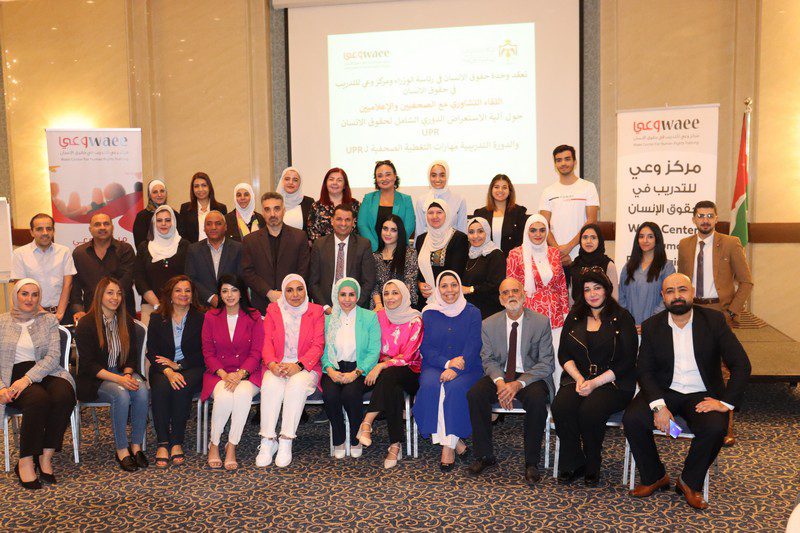“Freedom of opinion and expression is the foundation from which all other rights emerge,” asserted Taghreed Al-Doghmi, Founder of Waee Center and a lawyer with over 17 years of legal expertise, who recognized this critical connection to change Jordan’s human rights narrative.
Realizing the media’s influential role in promoting human rights and bringing about change in society, the Waee Center in partnership with the Prime Ministry’s Human Rights Unit trained 34 journalists and media professionals on human rights topics required to cover issues within the framework of the Universal Periodic Review (UPR).
This initiative came to light through the support of the Strengthening Civil Society and Media Systems (Sawt) Activity that awarded eight civil society organization (CSOs) to implement activities relevant to the upcoming UPR session for Jordan in 2024. The UPR grants are intended to advance CSOs’ engagement in representing human rights priorities and contributing to government’s human rights plans and policies.
The two-day workshop was designed to encourage the dialogue between the government and journalists, particularly around Cybercrimes and Access to Information Laws. Delivered by reputable legal experts, the workshop was a great opportunity for journalists to gain a deeper understanding on human rights’ principles, learn more about previous UPR recommendations, and improve their journalistic skills and coverage around human rights issues.
“The outcomes were immediately evident; journalists who had previously written articles with little regard for human rights began producing content that adhered to those principles,” stated Taghreed with excitement! “Their reporting progressed, demonstrating a greater comprehension of the UPR recommendations and a clear direction towards constructive criticism over false allegations.” She added.
However, the success did not end there. The tremendous response to the workshop revealed the thirst for knowledge and understanding among Jordan’s journalists and media professionals on human rights. Participants voiced their eagerness to receive similar workshops, addressing other pressing issues like the distinction between criticism and slander, handling certain situation without offending others, and navigating the complexities of laws like the Cybercrimes Law.
To further motivate journalists and media professionals to report on UPR recommendations, Waee launched a competition at the end of the workshop with a reward of $100 for the top three reports. Subsequently, selected journalists have published reports that showed vast improvement in comparison with previously written reports, reflecting the added value of this training on the quality of human rights reports.
The reports covered various human rights issues, including prison overcrowding, freedom of opinion and expression, Cybercrimes Law, child labor, women’s rights, among other topics.
Through this UPR grant, Sawt contributed to shifting the narrative around human rights in Jordan, showcasing the power of informed journalism and fact-based information. Furthermore, Sawt supported the collaboration among stakeholders for submitting shadow reports that comply with international human rights standards, and encouraged collaboration and positive dialogue between the media and government.
It is worth noting that UPR is a State-driven process, under the auspices of the United Nations Human Rights Council, which provides the opportunity for each state to declare what actions it has taken to improve the human rights situations in their countries through a peer review mechanism.
